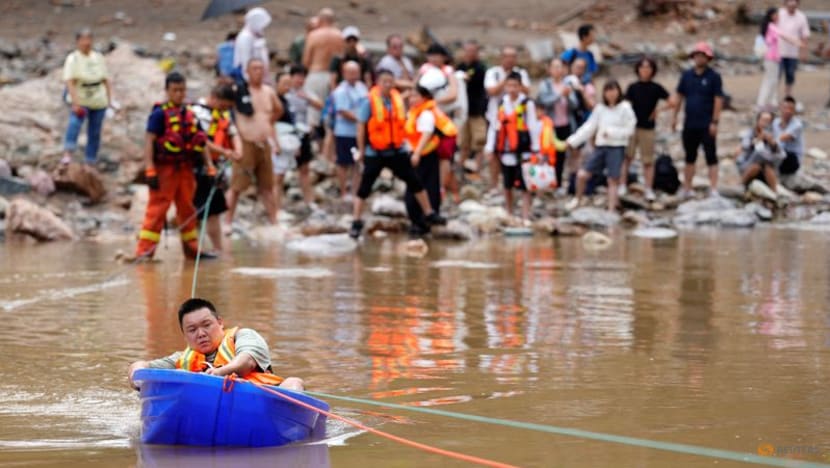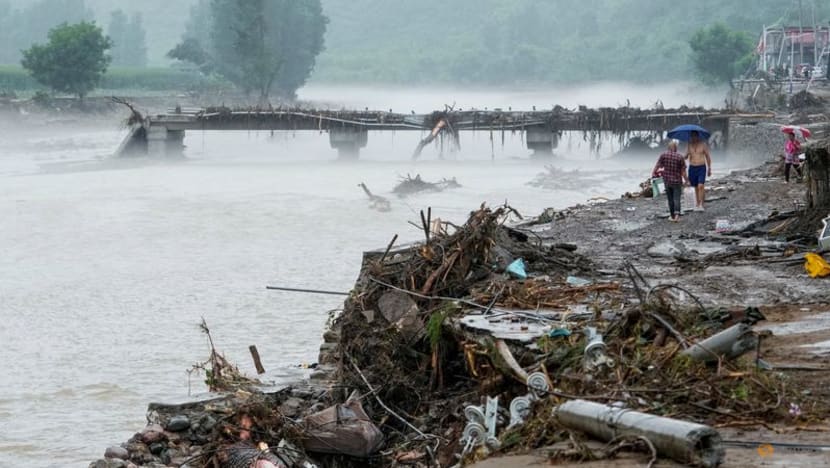At least 30 dead in Beijing following heavy rain
Chinese President Xi Jinping has ordered "all-out" search and rescue efforts after "heavy casualties and property losses" in Beijing and other provinces.

A man sits in a plastic boat to move to safety after heavy rainfall flooded the region, in Huairou district of Beijing, China, Jul 28, 2025. (Photo: Reuters/cnsphoto)
BEIJING: Extreme weather killed at least 30 people in Beijing after a year's worth of rain fell in less than a week, forcing the relocation of more than 80,000 people, damaging roads and cutting off power and communications in more than 130 villages.
Hundreds of flights and a number of train services were delayed or suspended as the storms peaked on Monday (Jul 28) night, stretching the capital's disaster management capabilities and prompting some experts to call the city a rain "trap".
Most of the rain had converged on Beijing's mountainous north near the Great Wall, with at least 28 deaths reported in the district of Miyun and two in Yanqing, Xinhua reported. The state-run news agency did not say when or how the deaths occurred.
"The flood came in an instant, you just had no buffer," said Zhai, 33, who runs a grocery shop in Miyun, now a disaster zone amid collapsed bridges, mangled cars and shattered pipelines.
She showed Reuters the marks left behind as the floodwaters receded. They had risen to 1.5 metres (4.92 ft), submerging her shop for hours and ruining her food and beverage stocks.
Liu, who owns a nearby restaurant, was on the verge of tears as she stared at the overturned stools and mud-covered table-tops in her eatery.
Large appliances like fridges had sat submerged for hours and were likely damaged, said her husband Yang, estimating the damage at more than 100,000 yuan (US$14,000).
"EXTREMELY DESTRUCTIVE"
Heavy rains began on Jul 23 and peaked around Beijing and surrounding provinces on Monday, with Miyun experiencing rainfall of up to 573.5mm - levels local media described as "extremely destructive". The average annual rainfall in Beijing is around 600mm.
The most intense downpour occurred on Saturday in Beijing's hilly Huairou, where 95.3mm of rain fell in one hour.
"The cumulative amount of precipitation has been extremely high - reaching 80–90 per cent of the annual total in just a few days in some areas," said Xuebin Zhang of the University of Victoria in Canada and CEO of the Pacific Climate Impacts Consortium.
"Very few systems are designed to handle such an intense volume of rainfall over such a short period," Zhang said.
The local topography - mountains to the west and north - "trapped" the moist air and forced it upward, amplifying the deluge, he said.
China's usually arid north has seen record rains in recent years, with some scientists linking it to global warming.
In the summer of 2023, heavy rain and flooding killed at least 33 people in Beijing. Rainfall in the city of Xingtai in the neighbouring Hebei province exceeded 1,000mm in two days - double the yearly average.
Late on Monday, President Xi Jinping said there had been "heavy casualties and property losses" in Beijing and the provinces of Hebei, Jilin and Shandong, and ordered "all-out" search and rescue efforts.


"FLOOD STILL COMING"
Heavy rain also pounded the province of Hebei and the city of Tianjin near Beijing.
In Hebei, eight people were killed as a landslide hit a village on Monday, after the region received six months' worth of rain over the weekend. Four remained missing.
In two villages in Tianjin on Monday, only the roofs of single-storey houses were visible, China Central Television (CCTV) reported.
The emergency management ministry said the disaster relief situation had been "complex and severe".
Residents pleaded for faster rescue efforts in posts on social media platform Weibo.
"The flood is still coming, and there is still no power or signal, and I still can't get in touch with my family!" a Weibo user wrote on Tuesday morning.













